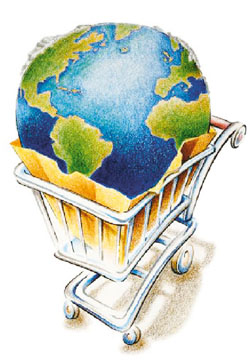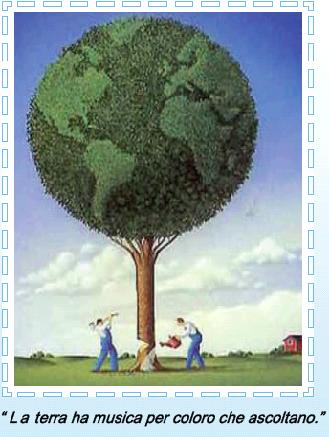
|

|
|
Acqua bene essenziale per l'umanit? non merce Petizione per impedire che vengano brevettati semi naturali | |
|
Il denaro come se la gente contasse qualcosa Non fare da soli ci� che � possibile fare insieme I numeri dell'ingiustizia (dati 1997) M'illumino di meno Laghetti alpini 1000 volte pi� inquinati dell'idroscalo di Milano (26/04/2002) Giornata Mondiale Pace - 01/01/2003 Assisi, 24 gennaio 2002 (link) 
Forgeranno le loro spade in vomeri, le loro lance in falci; un popolo non alzer� pi� la spada contro un altro popolo, non si eserciteranno pi� nell'arte della guerra. (Is 2,4)
|
8 agosto 2016 Dear Friend, As millions of people watch the Olympics in Rio or catch Pok�mon characters on their smartphones, we interrupt this program to bring you another piece of important news: Today is Earth Overshoot Day! In less than eight months, humanity has used nature�s budget for the entire year. From today on, we are depleting our natural capital. How is it possible to use more from nature than nature can renew? By emitting more carbon dioxide into the atmosphere than our oceans and forests can absorb, depleting fisheries and harvesting forests more quickly than they can reproduce and regrow, just to mention a few examples. Carbon emissions are the fastest growing contributor to ecological overshoot, with the carbon Footprint now making up 60% of humanity�s demand on nature. But there is good news! The world is on the cusp of positive change. The Paris Climate Agreement and U.N Sustainable Development Goals � both adopted within the past year � can set us on a new course. If we are to adhere to the 2�C goal set by the Paris Climate Agreement adopted by nearly 200 countries last December, the carbon Footprint will need to gradually fall to zero before 2050. This calls for a new way of living on our one planet. "Such a new way of living comes with many advantages. Still, making it happen takes effort," says Mathis Wackernagel, co-founder and CEO of Global Footprint Network. "Luckily it is possible with current technology, and financially advantageous with overall benefits exceeding costs. It will stimulate emerging sectors like renewable energy, while reducing risks associated with the impact of climate change, particularly the potential costs of stranded infrastructure assets. The only resource we still need more of is political will to act." #pledgefortheplanet and New Prizes! We�re inviting you to think about what this new way of living looks like to you. After all, each of us has the power to act for change in our daily lives. Our #pledgefortheplanet campaign has been issuing sustainability challenges to everyone who is curious to explore how, and who is eager to spread the word through their social media networks. We offer pledges related to diet, energy, transportation, and more. Our favorite pledge, of course, is become a natural resource expert. We even have a pledge for cities or regions that want to reduce their Ecological Footprints � with our pro bono help. We are thrilled that our newest partner, Ticket to the Moon, is donating three camping hammocks to our #pledgefortheplanet photo contest. With the addition of these new prizes, we are extending our photo contest by one week. You now have until August 15 to make your pledges HERE and enter the photo contest HERE to win a GoPro HERO Session camera or a Ticket to the Moon hammock. Even if you don�t win, you can still earn a discount to buy your own hammock when you make a pledge, thanks to partners Ticket to the Moon and My Drop in the Oceans. If pledging isn�t for you but you�re on Facebook, there is one other simple action we ask that you take: Please share our Earth Overshoot Day Facebook Post below so that it goes as viral as possible today to raise sustainability awareness worldwide: Today is Earth #Overshoot Day! We have used as much natural resources as the Earth can regenerate in the whole year. But the world is on the cusp of positive change. In the wake of the Paris Climate Agreement, now is the time for governments, businesses and individuals alike to create a world where future generations can thrive. #pledgefortheplanet www.overshootday.org Governments are moving On the government front, we�re encouraged to see some countries embrace the challenge of decarbonizing their economy. For instance, Costa Rica generated 97 percent of its electricity from renewable sources during the first three months of 2016. Portugal, Germany and Britain also demonstrated groundbreaking levels of renewable energy capability this year, when 100% of their electricity demand was met by renewables for several minutes or, in the case of Portugal, for several days. In China, meanwhile, the government has outlined a plan to reduce its citizens� meat consumption by 50%, which it calculates will lower the carbon dioxide equivalent emissions from China�s livestock industry by 1 billion tons by 2030. "The Paris Climate Agreement is the strongest statement yet about the need to reduce our carbon Footprint drastically. Ultimately, collapse or stability is a choice," adds Wackernagel. "We forcefully recommend nations, cities and individuals take swift, bold actions to make the Paris goals an attainable reality." It comes down to this: Balancing how much nature we use and how much is generated is paramount for humanity and wild species to thrive on our one planet. Each of us has the opportunity to participate. Through the choices we make every day as consumers and as citizens, we are already actively contributing to the world that we will be leaving future generations. Which begs the question: What kind of world are we choosing to create? Today is the third day of the Summer Olympic Games in Rio, Brazil. What if the expected 3+ billion viewers were as committed to taking action and building political will for a low-carbon economy as they are excited about watching athletes compete? That shift is our most important task at hand. Building a sustainable world will take nothing less than transforming our individual and collective mindsets and setting our imaginations free. Like the athletes in Rio, take a big leap. But instead of medals, yours will be for sustainability. Tell your friends about Earth Overshoot Day or tweet. Make a pledge or two or three. Help push Earth Overshoot Day later in the year. And create the world that future generations will be grateful for. Sincerely, The Earth Overshoot Day Team Global Footprint Network
WWF, Terra troppo sfrutta.
Se tutti gli abitanti della Terra vivessero come ilmezzo milione di abitanti dell'Unione europea, cio? circa il 7% della popolazione mondiale, sarebbe necessario non un pianeta solo, ma quasi tre (2,8). E' quanto emerge dall'ultimo rapporto del WWF. Se si continua ai ritmi attuali, gi? nel 2030 servirebbero due pianeti. A causa dello sfruttamento delle risorse, ? calato del30% lo stato di salute dellespecie globali, con picchi del 60%.
APPROVATA LA LEGGE SULL'ALTRA ECONOMIA NEL LAZIO
Nel Lazio l'altra economia ? legge. Il consiglio regionale ha appena approvato le 'Disposizioni per la diffusione dell'altra economia nel Lazio'. Sostegno e finanziamenti all?agricoltura biologica, al commercio equo e solidale, alle energie rinnovabili, al software libero, al turismo responsabile. Per la prima volta in Italia il Lazio concede dignit? istituzionale a questo tema stabilendo, con norma, principi e ambiti di applicazione. Tutti i prodotti che saranno realizzati con i benefici della legge saranno individuati con il Marchio regionale di ?Altra Economia?.
Nel corso dell'approvazione non ci sono stati emendamenti e quindi il testo definitivo ? quello approvato in Commissione, scaricabile in PDF da questo link.
fonte: CamminareInforma 20/07/2009
CORSO DI PERMACULTURA URBANA
Creare un paradiso a casa, vivere nell'abbondanza con il minimo sforzo
possibile e migliorare l'ambiente in cui si vive. Tutto questo sembra
difficile da ottenere? Non con una buona conoscenza dei principi base della
Permacultura.
Un giardino pu� essere molto di pi� di un posto dove coltivare verdure sane e
far crescere dei bei fiori. Ha il potenziale di essere un paradiso,
estremamente produttivo con il minimo sforzo e al contempo un piacevole
santuario che rilassa i sensi, e stimola la mente e il senso estetico. Grazie
alla Permacultura � possibile ottenere un sistema produttivo, efficiente e
molto bello esteticamente.
Un opportunit� per giardinieri, paesaggisti ma anche privati, per ottenere una
prospettiva diversa sui numerosi potenziali di un giardino e su come
svilupparli tramite la Permacultura.
La Permacultura non � un manuale di tecniche ma piuttosto un insieme di linea
guida per un cambiamento di comportamento. La Permacultura e un matrimonio
tra gente e luoghi.
Questo corso intensivo, tratta diversi temi, incluso:
fonte: GASBO

La Terra ? spesa Risparmiare risorse, risparmiare soldi A Castelmaggiore (BO) 
Aria, Acqua, Terra: una scelta consapevole Stefano Zamagni, Muarizio Pallante, Silvia Aquilini, Libera, Officina naturae, GasBo, GasBosco, e altri a Bologna PDF solo testo - PDF pieghevole
C'E' CALDO? AL POLO NORD E' PEGGIO...
(da CamminareInForma n. 110 - 30 giugno 2005 by La Boscaglia Viaggi a piedi)
Greenpeace lancia l'allarme: gli scienziati ci dicono che la temperatura della regione artica sta aumentando molto pi? rapidamente del previsto, circa due volte di pi? del resto del pianeta. Per la prima volta ascoltiamo previsioni relative ad un Artico senza ghiaccio non tra centinaia di anni, ma tra 70. La calotta artica raffredda l?atmosfera del pianeta, regola le correnti oceaniche, tra le quali la Corrente del Golfo, e rappresenta il 5% delle riserve mondiali d'acqua dolce. Se i ghiacci della Groenlandia scomparissero completamente, potremmo dire addio a gran parte del mondo come lo conosciamo oggi: il livello del mare salirebbe di sette metri con conseguenze disastrose per numerose citt? costiere ed intere regioni
come il Delta del Nilo o nazioni come il Bangladesh. E l?orso polare?
Questa specie dipende dal ghiaccio per la propria sopravvivenza. Quando il ghiaccio si ritira d'estate, aspettano il suo ritorno per spostarsi e cacciare. Se aumentasse il periodo in cui l?Artico rimane senza ghiaccio, diventerebbe problematico per le femmine di orso polare
accumulare abbastanza grasso per affrontare una gravidanza.
Uranio Impoverito
Inchiesta di Report
In 2 casi su 3 la coltivazione di ogm influisce negativamente sull'ambiente.
E' il risultato di una ricerca dell'autorevole e indipendente Royal Society effettuta per 3 anni su 60 campi sperimentali di mais, colza e barbabietole da zucchero. Mentre il mais non ha creato problemi, i campi di colza e di barbabietole hanno danneggiato animali e piante dell'ambiente circostante, facendo scomparire insetti e piante innocue, insomma modificando significativamente la biodiversit?. Resta inteso che la ricerca si ? ocupata solo dell'impatto degli ogm sull'ambiente e non sulla salute dell'uomo. Su quest'ultima non vi sono dati evidenti n? in un senso n? nell'altro. |









www.unicef.it www.fao.org Associazione Missioni Don Bosco www.operasanfrancesco.it |
?id=106568944&tp=3" alt="WOP!WEB Servizi per siti web... GRATIS!" width="180" height="34" border="0">
